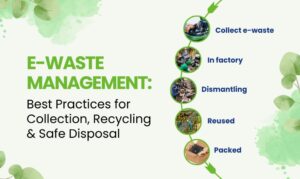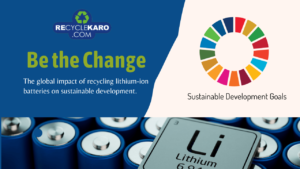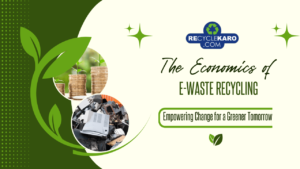Guide To EPR Compliance in India

The growing concern over environmental sustainability has led to the implementation of various policies aimed at reducing waste and promoting responsible consumption. One such policy is Extended Producer Responsibility (EPR), which holds manufacturers accountable for the entire lifecycle of their products, including post-consumer waste management.
In India, EPR has gained significant traction as a means to address the increasing volume of waste generated by consumer products. This blog serves as a comprehensive guide to EPR compliance in India, detailing its significance, obligations for producers, importers, and brand owners, and the impact of EPR on sustainable development.
What is Extended Producer Responsibility?
Extended Producer Responsibility (EPR) is a policy approach that mandates producers, importers, and brand owners to take responsibility for managing the waste generated from their products once they reach the end of their useful life. This includes the design, production, and disposal phases.
The primary goal of EPR is to encourage manufacturers to consider environmental impacts during the product design phase and promote sustainable electronic waste management practices.
Importance of EPR
EPR plays a crucial role in:
- Reducing Waste: By holding producers accountable for waste management, EPR encourages them to design products that generate less waste.
- Promoting Recycling: EPR fosters recycling initiatives by ensuring that manufacturers contribute to the collection and recycling of their products.
- Encouraging Sustainable Practices: Manufacturers are incentivized to use eco-friendly materials and design products that are easier to recycle.
- Creating a Circular Economy: EPR supports the transition towards a circular economy where materials are reused and recycled rather than discarded.
According to the Central Pollution Control Board (CPCB), India generated approximately 62 million metric tons of solid waste in 2020, with electronic waste being one of the fastest-growing segments.
Implementing EPR can significantly mitigate this issue by promoting responsible waste management.
EPR Compliance in India
In India, EPR compliance is governed by several regulations aimed at managing various types of waste, including plastic waste, e-waste, battery waste, and more. The key regulations include:
- Plastic Waste Management Rules (PWM): These rules mandate producers to manage plastic waste through collection and recycling initiatives.
- E-Waste Management Rules (EWMR): These regulations require producers of electronic goods to establish mechanisms for collecting and recycling e-waste.
- Battery Waste Management Rules: These guidelines focus on the safe disposal and recycling of used batteries.
Obligations for Producers, Importers, and Brand Owners
1. Producers
Producers are at the forefront of EPR compliance. Their responsibilities include:
- Designing for Recyclability: Producers must design products using eco-friendly materials that facilitate recycling.
- Establishing Collection Mechanisms: They are required to set up systems for collecting post-consumer waste and collaborate with authorized recyclers.
- Meeting Recycling Targets: Producers must achieve specific recycling targets set by regulatory authorities.
- Reporting: They need to maintain records of their waste management activities and submit compliance reports regularly.
2. Importers
Importers also play a vital role in EPR compliance. Their responsibilities include:
- Registration: Importers must register with relevant authorities and comply with EPR regulations applicable to the products they bring into India.
- Collaboration with Producers: They should work closely with producers to ensure seamless waste management processes.
- Reporting: Importers must provide periodic reports detailing their waste management initiatives.
3. Brand Owners
Brand owners who may not manufacture products but sell them under their brand name have specific EPR obligations:
- Collaborative Efforts: Brand owners must work with producers and importers to ensure compliance with EPR requirements.
- Supporting Sustainable Practices: They should promote recyclable products and sustainable business practices within their supply chains.
- Enhancing Brand Reputation: By actively participating in eco-friendly initiatives, brand owners can enhance their brand image among environmentally conscious consumers.
Implementation of EPR in India
1. Registration:
- Producers, importers, and brand owners must register with the relevant regulatory bodies such as the Central Pollution Control Board (CPCB) or State Pollution Control Boards (SPCBs).
- Registration involves submitting details about the types of products manufactured or imported along with an outline of proposed waste management strategies.
2. Developing an EPR Plan:
- Companies are required to develop an Extended Producer Responsibility plan detailing how they will manage post-consumer waste.
- The plan should include strategies for collection, transportation, recycling, and consumer awareness campaigns.
3. Setting Up Collection Mechanisms:
- Establishing effective collection systems is crucial for successful EPR implementation.
- Companies can set up collection centers or partner with Producer Responsibility Organizations (PROs) that specialize in managing post-consumer waste.
4. Achieving Recycling Targets:
- Regulatory authorities set specific recycling targets that companies must meet annually.
- Companies need to track their recycling efforts and report progress regularly.
5. Compliance Reporting:
Companies must maintain detailed records of their waste management activities and submit reports to regulatory bodies as required.
Regular reporting is essential for demonstrating compliance with EPR regulations.
Challenges in EPR Compliance
Despite its importance, several challenges hinder effective implementation of EPR in India:
1. Lack of Awareness:
- Many producers and consumers remain unaware of their responsibilities under EPR regulations.
- Increased awareness campaigns are needed to educate stakeholders about compliance requirements.
2. Inadequate Infrastructure:
- The lack of adequate infrastructure for collection and recycling poses significant challenges for effective EPR implementation.
- Investment in recycling facilities and collection networks is essential for success.
3. Informal Sector Involvement:
- A significant portion of e-waste is managed by the informal sector, which often lacks proper safety measures and environmental controls.
- Integrating informal recyclers into formal systems can enhance overall compliance efforts.
4. Data Management:
- Accurate data collection and reporting are critical for assessing compliance but can be challenging due to varying practices across industries.
- Implementing technology-driven solutions can improve data accuracy and reporting efficiency.
Impact of EPR on Sustainable Development Goals (SDGs)
EPR plays a vital role in achieving several United Nations Sustainable Development Goals (SDGs), including:
1. SDG 12: Responsible Consumption and Production
- Target 12.4 emphasizes achieving environmentally sound management of chemicals and all wastes throughout their life cycle. By promoting responsible disposal practices through EPR, India can significantly reduce pollution from hazardous materials.
2. SDG 14: Life Below Water
- Target 14.1 aims to prevent marine pollution from land-based activities. Effective e-waste management through EPR can reduce plastic pollution entering water bodies.
3. SDG 15: Life on Land
- Target 15.3 focuses on combating desertification and restoring degraded land. By promoting recycling initiatives through EPR, India can conserve natural resources and reduce land degradation caused by improper waste disposal.
4. SDG 11: Sustainable Cities and Communities
- Target 11.6 emphasizes reducing per capita environmental impact in cities through effective waste management systems supported by EPR initiatives.
5. SDG 6: Clean Water and Sanitation
- Target 6.3 aims to improve water quality by reducing pollution from hazardous chemicals—a goal aligned with effective e-waste management practices under EPR guidelines.
6. SDG 13: Climate Action
- Target 13.3 focuses on enhancing education related to climate change mitigation—an area where awareness campaigns under EPR can contribute significantly.
7. SDG 17: Partnerships for the Goals
- Target 17.16 emphasizes enhancing global partnerships for sustainable development—highlighting collaboration among stakeholders as essential for successful implementation of EPR policies.
How do PROs Help You Comply with EPR Guidelines?
Streamlining Waste Management Processes: Producer Responsibility Organizations (PROs) play a crucial role in facilitating compliance with EPR guidelines by streamlining waste management processes:
- PROs establish efficient systems for collecting post-consumer waste from various sources.
- They collaborate with authorized recyclers to ensure proper disposal methods are employed.
- By managing logistics related to collection and transportation, PROs alleviate some burdens from producers while enhancing overall efficiency in waste management operations.
Benefits of Collaborating with PROs
1. Expertise in Compliance:
- PROs possess specialized knowledge regarding regulatory requirements related to different types of waste streams—assisting companies in navigating complex legal frameworks effectively.
2. Cost Efficiency:
- By outsourcing certain aspects of waste management operations through PRO partnerships, companies can reduce operational costs associated with establishing individual collection systems or recycling facilities.
3. Improved Reporting Capabilities:
- PROs often have established data tracking systems that enable accurate reporting on collected volumes—facilitating compliance reporting processes for producers while ensuring transparency throughout operations.
4. Enhanced Consumer Awareness Initiatives:
- PROs frequently run awareness campaigns aimed at educating consumers about responsible disposal practices—contributing positively toward achieving broader sustainability goals within communities.
Conclusion
Extended Producer Responsibility (EPR) represents a critical step toward achieving environmental sustainability in India by holding manufacturers accountable for managing post-consumer waste effectively throughout product lifecycles. With increasing volumes of solid waste generated each year—particularly e-waste—it is imperative that stakeholders across industries embrace their responsibilities under this framework.
By understanding obligations related to registration processes; developing comprehensive plans; establishing robust collection mechanisms; achieving recycling targets; overcoming challenges associated with implementation; leveraging partnerships with PROs; aligning efforts with United Nations Sustainable Development Goals—India can pave the way toward a greener future where resource conservation becomes paramount while minimizing negative impacts associated with improper disposal practices!
Through diligent adherence to these principles outlined within this guide—businesses not only fulfill legal obligations but also contribute meaningfully toward building sustainable communities capable of thriving amidst rapid technological advancements!



